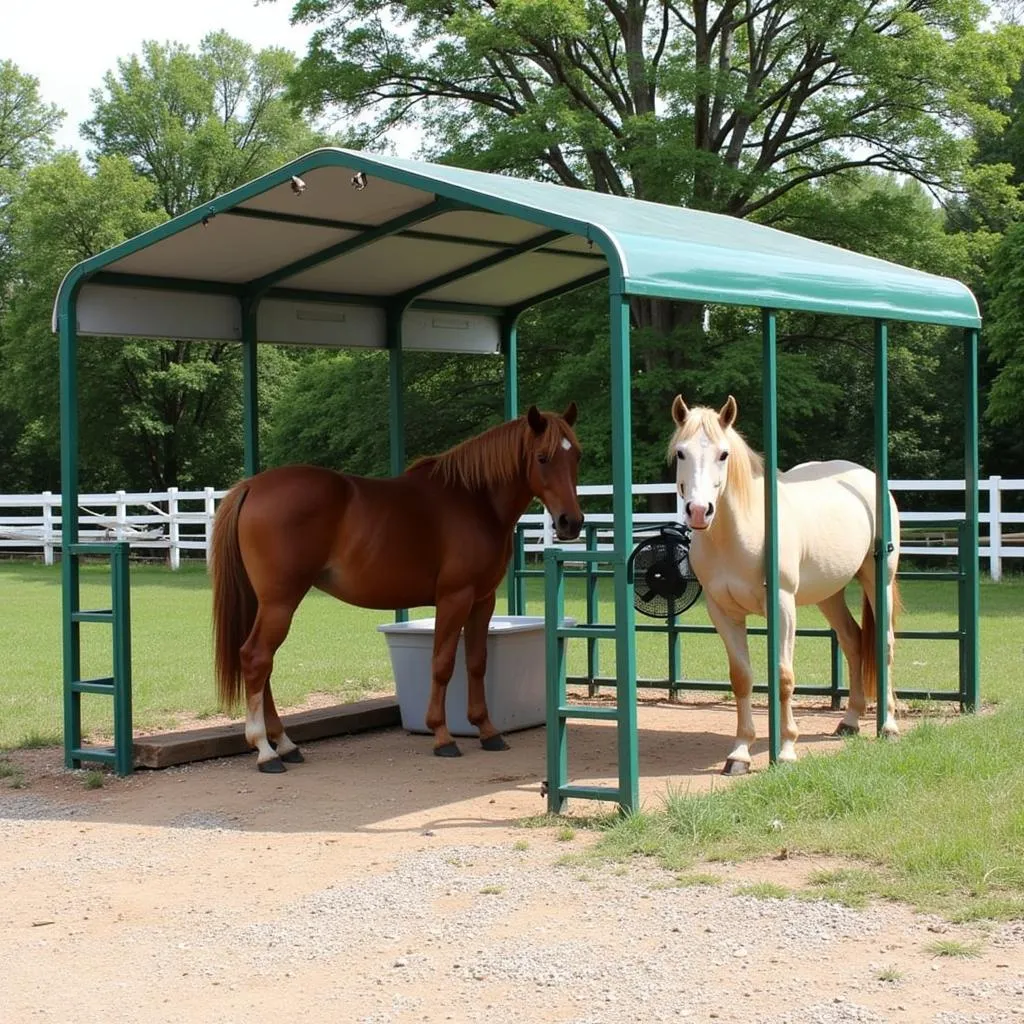Summer is a wonderful time to enjoy the outdoors with your horse, but it also brings the challenge of keeping them cool and comfortable in the heat. High temperatures can put your horse at risk for heat stress, so it’s important to take steps to help them stay cool and hydrated.
This article will explore several practical tips for keeping your Horse Cool during the summer months. We’ll discuss strategies for creating a comfortable environment, managing their workload, and recognizing the signs of heat stress. Let’s dive in and learn how to keep your equine companion safe and happy during the summer heat.
The Importance of Keeping Your Horse Cool
Horses are naturally equipped to deal with hot weather to some extent, but they can still suffer from heat stress if not properly cared for. The risk of heat stress increases with high humidity, strenuous activity, and underlying health conditions.
“Heat stress is a serious condition that can be fatal if not addressed quickly,” says Dr. Sarah Thompson, a veterinarian specializing in equine health. “Understanding the signs of heat stress and knowing how to cool your horse down is critical for their well-being.”
Creating a Cool Environment for Your Horse
Provide Shade and Ventilation
 Horse Shade and Shelter
Horse Shade and Shelter
Shade is essential for keeping your horse cool. Ensure they have access to ample shade throughout the day, especially during the hottest hours. Consider investing in a sturdy shade structure, such as a horse shelter or a large tree with branches spread out to provide plenty of shade.
Proper ventilation is also vital. A well-ventilated stable or shelter will help circulate air and keep the temperature cooler inside.
Ensure Access to Fresh Water
Access to fresh, clean water is crucial for horses, especially in hot weather. Ensure your horse’s water trough is full and refilled regularly. You can also encourage your horse to drink by adding ice cubes or a small amount of salt to their water.
Managing Your Horse’s Workload
Adjusting your horse’s workload during hot weather is essential for their safety.
Avoid Strenuous Activity in the Heat
Avoid strenuous activities during the hottest parts of the day. If you must ride, try to do so early in the morning or late in the evening when the temperature is cooler.
Consider Shorter Rides
Instead of long rides, opt for shorter, less intense sessions. This will help your horse conserve energy and prevent overheating.
Allow for Recovery Time
After any activity, allow your horse time to cool down and recover. This means providing shade, fresh water, and a cool place to rest.
Recognizing the Signs of Heat Stress
It’s crucial to be aware of the signs of heat stress in horses. Early detection is key to preventing serious complications.
Signs of Heat Stress in Horses
- Excessive sweating
- Rapid breathing and heart rate
- Elevated body temperature (over 102.5°F)
- Weakness, lethargy, and stumbling
- Reddened gums and mucous membranes
- Loss of appetite and thirst
- Anxiety and restlessness
- Muscle tremors and seizures
If you notice any of these signs in your horse, it’s important to take immediate action to cool them down.
Cooling Your Overheated Horse
If your horse shows signs of heat stress, take steps to lower their body temperature as quickly as possible.
Cooling Down Measures
- Move your horse to a shaded area with good ventilation.
- Provide access to fresh, cool water.
- Use a hose or cool water to wet your horse’s coat, especially on the chest, neck, and legs.
- Use a fan to circulate air around your horse.
- If available, use an ice-water bath to cool them down quickly.
“It’s important to act quickly if you suspect your horse is suffering from heat stress,” emphasizes Dr. Thompson. “Prompt intervention can make a significant difference in their recovery.”
Preventing Heat Stress: Additional Tips
- Grooming: Regularly grooming your horse helps remove excess hair and encourages air circulation, keeping them cooler.
- Diet: Ensure your horse’s diet is balanced and provides adequate electrolytes, which can be lost through sweating.
- Electrolyte Supplements: Consider providing electrolyte supplements to horses that are working hard or living in hot climates.
FAQ
Q: What is the optimal temperature for a horse?
A: The ideal temperature for a horse is between 60°F and 70°F. However, they can tolerate temperatures up to 80°F if they have access to shade and water.
Q: Should I give my horse ice water?
A: Avoid giving your horse ice water as it can shock their system and cause digestive upset. Offer cool water that is slightly above room temperature.
Q: When should I call a veterinarian?
A: If your horse shows signs of heat stress, such as a high body temperature, muscle tremors, or seizures, contact your veterinarian immediately.
Conclusion
Keeping your horse cool during the summer months is crucial for their well-being. By providing shade, fresh water, managing their workload, and recognizing the signs of heat stress, you can help your horse stay safe and comfortable throughout the summer. Remember, early detection and prompt action are essential for preventing serious complications.
Always remember to be a responsible horse owner and prioritize your horse’s health and safety, especially during hot weather. If you have any concerns, don’t hesitate to contact your veterinarian for advice and support.
Please note: This content is for informational purposes only and is not intended to replace professional veterinary advice. If you have any questions or concerns about your horse’s health, please consult a qualified veterinarian.